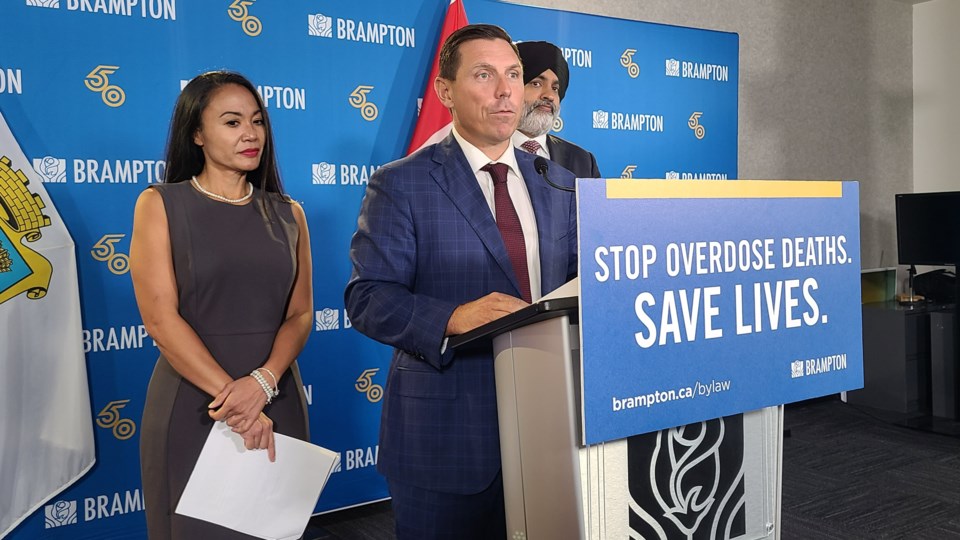EDITOR’S NOTE: This article originally appeared on The Trillium, a Village Media website devoted exclusively to covering provincial politics at Queen’s Park
The Ford government is facing growing calls from some of the province's mayors to force people with mental health and addiction issues into treatment.
At a press conference on Thursday morning, Brampton Mayor Patrick Brown called on the Progressive Conservative government "to introduce involuntary treatment programs for individuals unable to seek care, due to the severity of the conditions" such as mental illness, addiction or brain injuries.
"The term that I prefer is 'compassionate intervention,'" said Brown, who insisted the growing number of mental health calls and opioid-related deaths justifies such a move. Peel Region Police, he noted, perform an average of 14 "mental health apprehensions" per day.
"This is not police doing police work. This is police having to fill the void because the government has not acted," Brown said.
Brampton is not the only community looking to send people for treatment without their consent.
At their upcoming Oct. 18 meeting, the Ontario Big City Mayors (OBCM) caucus is planning to vote on a motion that calls for legislative changes to allow for a "system of mandatory community-based and residential mental health and addictions treatment" in response to increasing homeless encampments in their cities.
The resolution suggests the provincial and federal governments invoke the notwithstanding clause to prevent likely constitutional challenges and ensure "that individuals in need are able to access treatment."
The OBCM declined to comment on the proposed resolution because its member cities have not had a chance to debate or vote on it. However, Brown and a spokesperson for a spokesperson for Barrie Mayor Alex Nuttall said the mayors of Kingston, Brantford and Barrie introduced it for consideration.
"There are other mayors who just they can't believe what's happening in their communities," said Brown, referring to the encampments.
"There's a strong feeling that the [status quo] approach of accepting hundreds of overdose fatalities is unacceptable. It's inhumane."
Brampton is specifically asking for the province to implement a pilot project in Peel Region to allow "first responders to place a person in a psychiatric facility if a doctor deems it necessary for their health and safety, as well as the safety of others." Beyond this, the proposal is light on specifics.
Brown and city councillor Rowena Santos explained that they are taking inspiration from the British Columbia government, which proposed last month to take people with addiction challenges, brain injuries and mental health issues to highly secure facilities, including those within the correctional system.
The Canadian Mental Health Association of British Columbia has expressed reservations with BC's plan, saying "there is a lack of evidence to support the effectiveness of involuntary treatment for people with substance use disorder" and that it may instead pose "an increased risk of death due to drug poisoning upon release."
"We acknowledge that involuntary care may be a needed last resort for those at extreme risk of harm to themselves or others, but it must be just that – a last resort, not a sweeping solution," the organization wrote.
Santos agrees, telling reporters that involuntary treatment in Ontario "should be seen as a last resort" to be used only "when less intrusive measures have been completely exhausted," and paired with "broader initiatives addressing the root causes of addiction and homelessness."
"Compassionate intervention should focus on rehabilitation and reintegration rather than punishment or control," she said. "Simply detaining individuals for treatment without tackling the underlying social determinants such as homelessness will not result in lasting recovery."
Asked about the possibility of bringing involuntary treatment to Ontario during a press conference on Wednesday, Premier Doug Ford said the province would "have to look into it pretty deep" before moving ahead.
Ford added that Associate Mental Health Minister Michael Tibollo "is a big fan" of compulsory treatment. Brown, meanwhile, noted that during his conversations with Tibollo about a pilot project, it was clear Tibollo "admires the work" being done by BC.
Tibollo's office did not respond to a request for comment. Instead, Health Minister Sylvia Jones office issued a statement that seemed to downplay the possibility of involuntary treatment in Ontario.
"Our government’s focus is on creating a system of care that prioritizes connecting people who want treatment to the care, support, and treatment they need, where and when they need it," said a spokesperson for Jones.
At his press conference, Ford also said encampments are "a big problem" whose denizens need to be moved "out of public spaces" and into permanent homes.
"Communities across the province, they're just they're beside themselves," said Ford.
